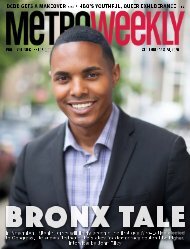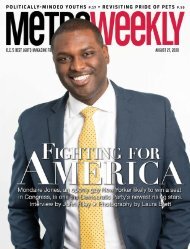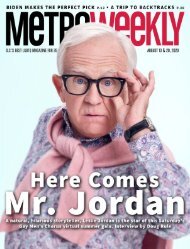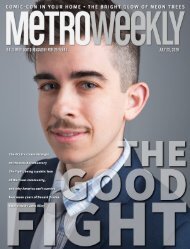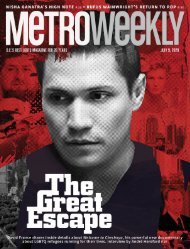Victory Fund's Annise Parker - Metro Weekly - July 16 2020
Cover Story: Annise Parker rose to become Houston’s first LGBTQ mayor. Now leading the Victory Fund, she’s helping others reach even higher. Interview by John Riley Also: The newly-rechristened Chicks return with a comeback album that showcases their greatest strengths.
Cover Story: Annise Parker rose to become Houston’s first LGBTQ mayor. Now leading the Victory Fund, she’s helping others reach even higher. Interview by John Riley
Also: The newly-rechristened Chicks return with a comeback album that showcases their greatest strengths.
Create successful ePaper yourself
Turn your PDF publications into a flip-book with our unique Google optimized e-Paper software.
selves to the president or running against him. And it’s destroying<br />
that sense of “all politics is local.”<br />
PARKER: And that is certainly not what we teach them at <strong>Victory</strong>.<br />
Now, Donald Trump has been the best recruiter for Democratic<br />
candidates at every level of the ballot you could possibly hope<br />
for. They may have been inspired because they’re so appalled by<br />
him and his policies. But the ones who win are the ones who find<br />
the appropriate sort of local issues and offer a plan that voters<br />
can identify with.<br />
In nonpartisan years, it’s a very different feel, but this is a very<br />
partisan year. If you're running as a Democrat, you’re expected<br />
to be anti-Trump. And if you’re running as a Republican, I<br />
think you have to kiss up. But because of decades of partisan<br />
gerrymandering, we don't have very many seats at the federal<br />
level, congressional seats, for example, that are in play. You can<br />
play along the margins, but because of the way we redistricted,<br />
there's not a lot a candidate can do, which is [why] it's big news<br />
when we flip a seat red to blue or blue to red.<br />
MW: Is it harder nowadays to find LGBTQ Republicans who can<br />
meet those criteria? It seems there are fewer out Republicans<br />
attempting to run, and that more LGBTQ people are identifying<br />
with the Democratic Party in this current environment.<br />
PARKER: Well, way more than 80 percent of our LGBTQ elected<br />
officials are Democrats. It’s an interesting fact. If you go to our<br />
website “Out for America,” where you can sort by party affiliation,<br />
there are more trans elected officials than there are openly<br />
LGBTQ Republican elected officials in America. And nearly all<br />
of our self-identified Republicans are elected in nonpartisan<br />
down-ballot races. Because as you mentioned, it is so difficult<br />
to get through Republican primaries. It was bad before Trump,<br />
but they have become absolutely toxic for LGBTQ candidates. So<br />
they're not running. Or they're not running openly.<br />
We work hard to endorse Republicans. Our standards as an<br />
organization are that you have to be openly LGBT. Candidates<br />
have to believe in some level of a right to privacy, which includes<br />
the right to abortion. Some of our candidates only believe<br />
in it after rape and incest, all the way<br />
to others who support the full Planned<br />
Parenthood position. And they have to be<br />
fully trans-inclusive. We have declined to<br />
endorse some who do not believe that gender identity is their<br />
issue to care about.<br />
It’s difficult for a lot of Republicans because we are prochoice.<br />
We ask them in their hearts, “Can you find a place here<br />
where you can define yourself in a way that we can support<br />
you?” But that is a hurdle in terms of seeking our endorsement.<br />
We train them, whether or not they can ever sign our pledge and<br />
be an endorsed candidate. And we’ll do our best to sustain them<br />
because we believe that our democracy is better when we're in<br />
both parties and we're represented everywhere.<br />
MW: What do you think accounts for the increase in the number of<br />
transgender candidates running for office?<br />
PARKER: Well, I would say success breeds success. And it’s<br />
because the more we win, and the more we talk about the ones<br />
who win, the more they feel like they might have a chance. But<br />
the other factor is that the trans community has been under<br />
such attack by the right. You know, they still attack the gay and<br />
lesbian community. But really, a lot of the worst bills have been<br />
anti-trans bills. And the Trump administration is virulently<br />
anti-trans. And so if you have any self-respect and you're under<br />
attack, you're going to stand up for yourself.<br />
MW: We’re also seeing a number of LGBTQ people of color being<br />
successful in their races this cycle.<br />
Click to Learn More About<br />
The <strong>Victory</strong> Fund<br />
PARKER: We were among the first people to get behind [congressional<br />
candidates] Ritchie Torres and Mondaire Jones, as well<br />
as [New York State Senate candidate] Jabari Brisport, whose<br />
race still hasn't been called, but we think he'll be there, too. It is<br />
important to us that the candidates that we support are reflective<br />
of America. And interestingly, we have data going back quite a<br />
few years, in terms of who we’ve endorsed. Just in the last few<br />
years and since we've been publishing our “Out for America”<br />
report and stats on our endorsed candidates, the LGBTQ people<br />
who run — not just the ones who we support — are three times<br />
as diverse as the general pool of candidates.<br />
<strong>Victory</strong> has specific programs to increase the number of candidates<br />
of color which are available on the Institute’s website.<br />
We work hard to increase that number. From the standpoint of<br />
Pete Buttigieg running for president, and everybody said, “Oh<br />
well, he's doing really well in Iowa and New Hampshire, but<br />
black people in the South will never vote for someone who’s<br />
openly gay.” I'm here to tell you that’s not true, but what will<br />
make even more of a difference is that if we have more and more<br />
open candidates of color, officials of color at the highest levels,<br />
including Mondaire and Ritchie and advocates who will get out<br />
and dispel that myth.<br />
MW: Obviously, it's not an elected position, but will we see an out<br />
LGBTQ person in a presidential cabinet, as opposed to a “cabinet-level<br />
position”?<br />
PARKER: We absolutely expect in a Biden administration there<br />
will be. And we fully expected that, had there been a Clinton<br />
administration, there would have been as well. There's no doubt<br />
in our minds.<br />
MW: What do you think is the next frontier in LGBTQ politics?<br />
PARKER: Pete Buttigieg was a game changer in a lot of ways.<br />
He wasn't the first LGBTQ candidate for president. That was<br />
Fred Karger, who ran eight years ago in Obama's re-elect as a<br />
Republican. But he was more of an insurgent candidate and the<br />
party did everything they could to keep him out.<br />
What was fascinating to watch in the Pete Buttigieg campaign<br />
— and we ultimately endorsed<br />
him, but we made him wait for it for six<br />
months, and he had to prove himself — is<br />
that he was treated like any other candidate<br />
by the party in the primary. Sure, I’m certain that there are<br />
people who would never have supported him and didn't support<br />
him because he’s openly gay. But in terms of the party apparatus,<br />
it was completely available to him. And the next time someone<br />
runs from our community, that will be the expectation. And we’ll<br />
eventually get there on the Republican side as well.<br />
One of our goals at <strong>Victory</strong> is to make sure that there is a<br />
deep pool, a bench, of candidates. Right now, we have two U.S.<br />
senators, two governors, two attorneys general, a handful of<br />
statewide elected officials. That’s not a deep enough bench to be<br />
presidential material, to be vice presidential candidates. So what<br />
is the next big milestone? To have a bench of 20 or 30 people, big<br />
city mayors, statewide elected officials with a national profile,<br />
who can really step up.<br />
Pete did an amazing job. He’s actually got great political skills<br />
and was a phenomenal candidate. But he had to work really hard<br />
to go from a mayor of a mid-sized city with a kind of hard name<br />
to pronounce to a presidential contender. And so, one of our<br />
goals is to make sure that the next one to make that leap doesn’t<br />
have to work quite as hard.<br />
Learn more about The <strong>Victory</strong> Fund by calling 202-VICTORY<br />
(842-8679) or visiting www.victoryfund.org.<br />
30<br />
JULY <strong>16</strong>, <strong>2020</strong> • METROWEEKLY.COM




